Review by Steven Lee Sharpe
WARNING: SPOILERS
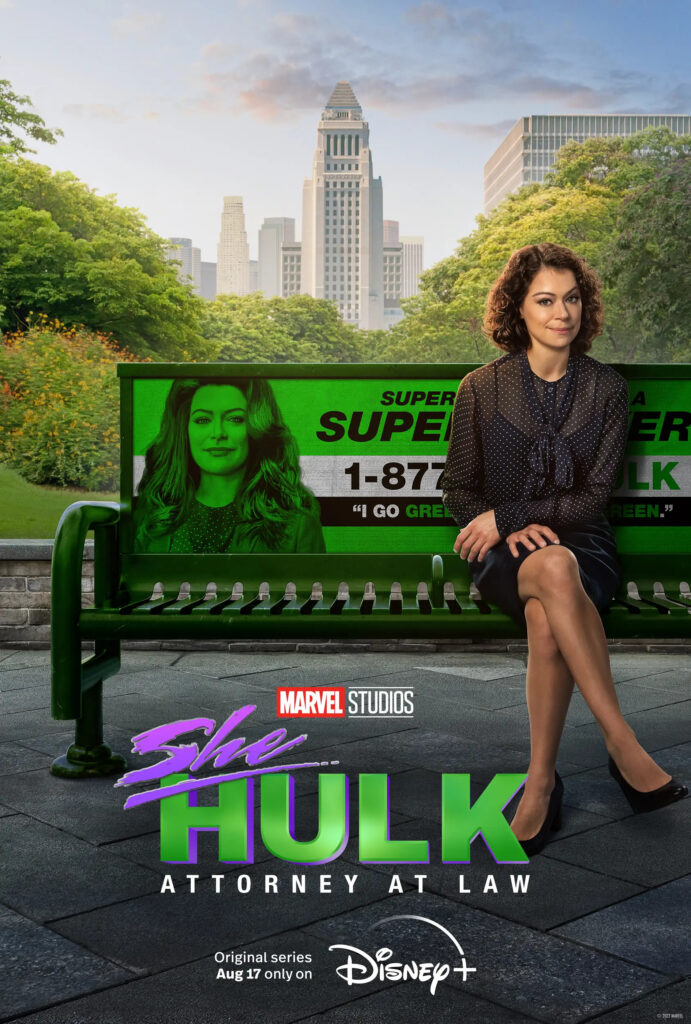
Tell someone you’re watching a Marvel TV show and it’ll probably be met with less of an open mind than if you’re watching a non-Marvel TV show. You may get an eyeroll and an immediate look of disinterest due to the level of all-in or all-out approach towards the Marvel Cinematic Universe. There also seems to be a sense that while watching a Marvel production, you need to be wearing Marvel Glasses that enable you to fully appreciate, make allowances for, and/or feel entitled to be aggrieved about choices that have been made in adapting the source material. More significantly, it also means that some people will be determined – nay, feel obligated – to watch every single second of the production and talk about it ad nauseum across the internet and in comic shops whether they like it or not.
See? Even a Marvel TV show review comes with a rider. But stick with me, in this case it’s pertinent.
In 1989, writer and illustrator John Byrne worked on a radical relaunch of She-Hulk which saw her going from Savage to Sensational, complete with an awareness of fashionable clothes and a sexier physique. Byrne got away with this sexualisation of the character by making her so self-aware that she knew she existed in a comic book. The first issue cover had her in a swimsuit-style costume, glaring at the reader and demanding that you buy her comic otherwise she would “come to your house a rip up all your X-Men” (a challenging choice for an adolescent).
She-Hulk would talk about changing clothes “between panels”, tear through an ad page, and interact with Byrne himself, berating him about how he was portraying her – and eventually throwing him through a window on his final issue. The editor of the series, Renée Witterstaetter, also found herself written in on occasion. All this before the likes of Deadpool and Lobo were doing it.
Sensational She-Hulk ran until #60 (February 1994), making it Marvel’s longest-running female title at that point. There followed ten years of guest appearances, until She-Hulk (or Shulkie as she has been known) got a new solo series, written by Dan Slott and illustrated by Juan Bobillo. Jennifer Walters/She-Hulk was now a practising suit-wearing lawyer representing the superhero community. There were no asides to the reader or creator, but the tone leant towards comedy. The first story arc was titled Single Green Female.
And so, between these two incarnations of She-Hulk, we have the TV show She-Hulk: Attorney At Law.
The first episode opens on a headshot of Jen, as played by the excellent Tatiana Maslany, looking directly at the camera and asking “What is the responsibility of those who have power?” Jen is practising her closing argument to a case she is working on. The opening is portentous; she rewords the most famous theme in Marvel comics (with great power comes great responsibility). And she was looking at you, dear viewer.
As she leaves the office, Jen’s colleague and friend Nikki (Ginger Gonzaga showing great chemistry with Maslany) asks Jen if she’ll Hulk-out if things aren’t going well in court. Jen excuses herself and re-enters the office so that she can address the audience properly. She tells us that we won’t be able to focus on this “fun, lawyer show” until we find out how she became She-Hulk. It’s the first proper introduction to the breaking of the fourth wall which peppers the show. But this isn’t just a gimmick, getting an extra laugh with a knowing wink, or heightening empathy with the central character; Jen frequently anticipates what we’re thinking. But more on that later because, on second viewing of this series I realised that so much of what happens in the series, thematically and tonally, is telegraphed in the opening episode.
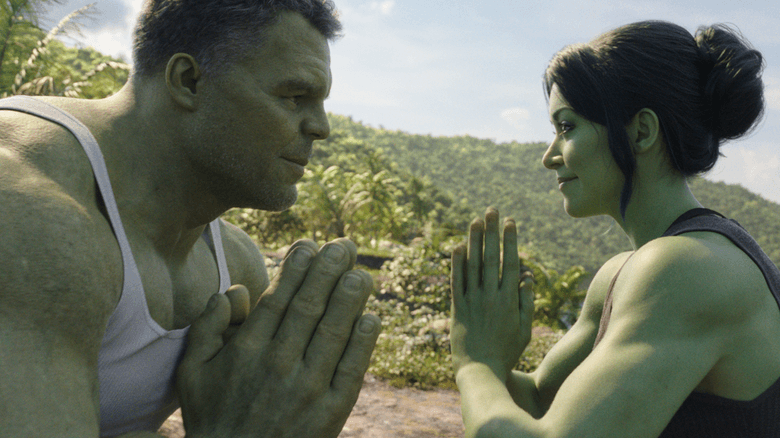
For example, the humour. The bulk of the episode is taken up with the scenes between She-Hulk and Hulk (the ever-reliable Mark Ruffalo who’s in danger of looking as if he’s doing this in his sleep) as he tries to teach her how to deal with her powers. The Hulk in the MCU has gone from a dangerously unpredictable force of nature (see Avengers Assemble) to shorter, more sensitive and intelligent, gentle giant. Which may frustrate some Marvel fans, but makes him a great addition to comedy. So the humour ranges from the juvenile (belches, drunkenness, Hulk getting stroppy) to cute interplay, for example when Jen jumps on the fact that Hulk is now known as Smart Hulk:
“Smug Hulk”, she calls him.
“Smart Hulk”, he corrects.
“It’s pretty smug to call yourself Smart Hulk.”
“I didn’t come up with it.”
“But you use it. That’s implied endorsement.”
“Don’t lawyer me.”
If it doesn’t make you smile, then check out now. Comedy is critic-proof – it doesn’t matter how well something is made if the jokes don’t land. It’s the divisive nature of comedy.
In this episode we also get an exploration of the strong feminist slant that runs through the show. And that doesn’t just mean scenes of bad-mouthing men and watching women get the better of them – although that does happen too: when a group of drunk guys come across a vulnerable Jen and try to take advantage, Jen changes into She-Hulk and sees them off. But that’s not so much feminism as general power fantasy which is at the heart of pretty much all superhero stories. More interestingly, when a group of women find Jen in the dishevelled state, they assume it’s the fault of a man and then try to glamourise her, to make her feel better. Which Jen rejects.
It’s in the interplay between Hulk and She-Hulk that the writers get to exercise their cranial muscles. As Hulk discovers that there are differences between him and his cousin, it becomes difficult to ignore a Male VS Female comparison. She-Hulk frequently takes the micky out of male, animalistic aggression – most amusingly, when she imitates the conventional Marvel landing pose – and their frustrations with one another keep descending into physical violence which, is kept light-hearted because both are indestructible. But it’s also in the dialogue too. When Hulk tells Jen that the triggers of Hulking out are anger and fear, she says “Those are, like, the baseline of any woman existing.” Later, she goes on to explain: “I’m great at controlling my anger – I do it all the time. When I’m catcalled in the street. When incompetent men explain my own area of expertise to me. Pretty much every day of the week I have to control it because if I don’t, I’ll get called emotional, or difficult or I might just literally get murdered. So if I claim to be better at controlling my anger it’s because I do it infinitely more than you.”
It’s a great point to make, and, amusingly, it’s delivered as Jen is losing her temper. But that’s the point, she’s not claiming that she never gets angry. Plus, it makes the point more impassioned.
Things between Hulk and She-Hulk end with a good-natured truce and then we’re back, up to date and in the courtroom. It’s not long before regular She-Hulk villain Titania (majorly re-invented for the show to present a caricature of vanity obsession) makes and appearance. Once again, this scene sets a tone for the series; her arrival isn’t explained, neither are her powers (not even in subsequent episodes), and the fight is over in a second. There’s a sense of following a formula – we need a fight with a villain to round off the episode, right? But the show is also resisting it, even if that means viewers will be disappointed. But as Jen reminds us for the second time in the episode, this is a “lawyer show”.
It’s a point that rears its head to bigger affect in the final episode. Villains are revealed, plans are explained, and cameos come together for the big fight – Hulk, Abomination, Fan-Hulk, Titania. That is, until Jen brings events to a halt claiming that it doesn’t make any sense. We then cut to the Disney+ Marvel section of the options menu screen and in true John Byrne-era style, She-Hulk pops her head out of one of the icons and climbs into another. She’s off in search of the writers of the show, who she tracks down to the studio writers room. She wants to know why the character story arcs have been jettisoned in favour of a big non-sensical fight. They tell her that she needs to talk to “Kevin”. Of course, we think that they must be talking about Kevin Feige, except the show has another trick up its sleeve; Kevin turns out to be a computer (K.E.V.I.N. – Knowledge Enhanced Visual Interconnectivity Nexus), an AI unit that creates Marvel movies and TV shows using algorithms. Some are successful, some less so, it explains, but that’s “for the internet to decide”.
Boom. Did Marvel just take a nibble at the hand that feeds it?
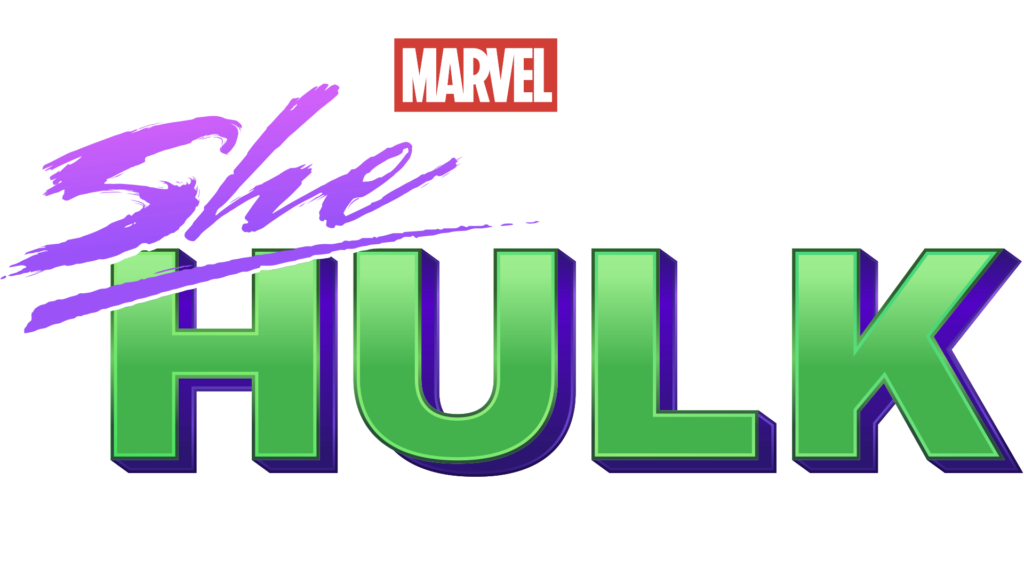
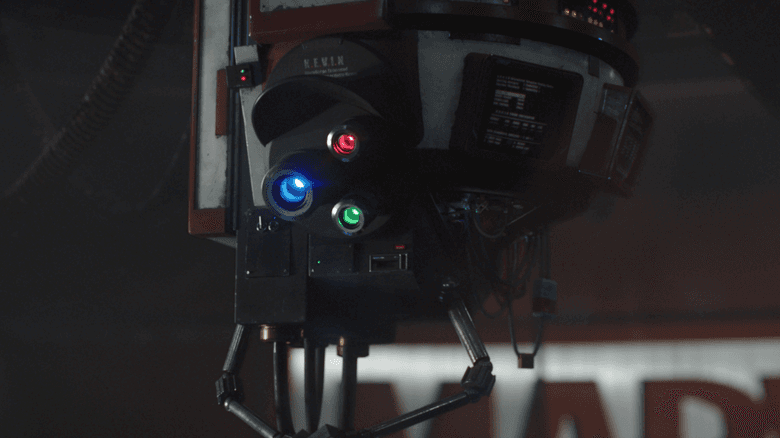
Just as she was all those years ago in the 1980’s, She-Hulk is challenging the creators, this time for the way they resort to CGI battles. But who is driving those tropes – the writers, the producers, or the demanding internet keyboard warriors who have the power to get roles re-cast, and meta-bomb bad reviews?
“This isn’t even a reluctant superhero story – I’m getting screwed over,” says Jen before looking directly at us. “Is this what you guys want?” she asks.
What a question. What do we want from a genre that is predominantly formulaic? What do James Bond fans want from a 007 film? In some ways, She-Hulk: Attorney At Law gives Marvel fans exactly what they want with all the in-jokes. When Hulk talks about his last meeting with Abomination, he says that he’s “a completely different person now – literally,” referring to the fact that Edward Norton was playing Banner at the time. At one point, K.E.V.I.N. asks She-Hulk to transform back to Jen to save money on the FX because the team are working on the next project, which is accompanied by a short burst of the music for Black Panther – how many levels knowing humour whilst doing that Marvel thing of shoehorning the next project into the current one? Talk about having your cake and eating it. All this in an episode that starts with a recreation of the 1970’s TV show title sequence.
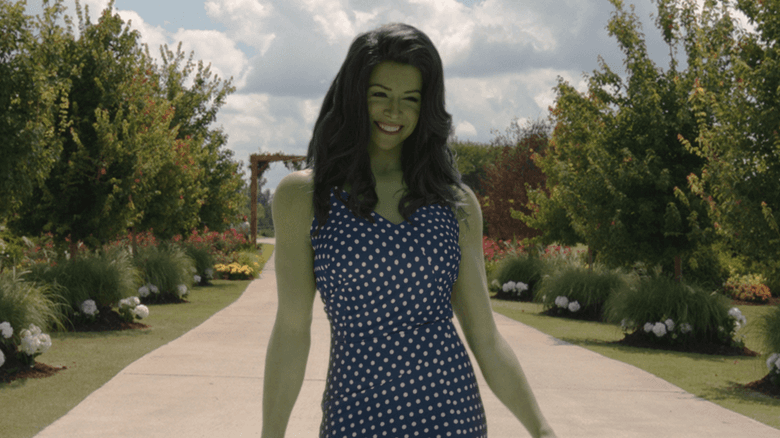
You want more? Jen asks K.E.V.I.N. when we’re going to get to see the X-Men, excitedly giving us the thumbs up because she knows we’re all keen. She’s one of us, right? But in the beginning of episode six she gleefully fills some comic fans with dread by telling us: “Yes it’s a self-contained wedding episode, and if you think this is happening at an inconvenient moment in the season, then you’re right.” You can almost hear the groans from some sections of the audience, followed by the clickety-clack of keyboards. You can’t say that you don’t get plenty of warnings about the nature of the show.
It’s not perfect. Some people have cited the CGI as a reason for not liking the show. Maybe my standards are lower, but I found it to be fine. It doesn’t hinder Tatiana Maslany’s nuanced performance as She-Hulk, but there are times when it’s distractingly unconvincing. Sometimes the comedy misfires. The credit stings I found to be weak, for example, mainly because they seemed to be over-egging a joke already made. When a show is this knowing and clever, any missteps are glaring. For example, the eighth episode is the strongest, but it’s topped and tailed by less convincing scenes. It features Daredevil, once again played with effortless charm by Charlie Cox. The chemistry and dialogue between him and She-Hulk is great (“Well it’s very daring of you to use ketchup and mustard as your colour scheme”), and the episode includes a wonderful pastiche of the crap-villains-with-rubbish-goons-in-ridiculously-themed-hideout that were a mainstay of the 60’s Batman TV show. But the opening scene of the episode with Leapfrog is a little too hammy, and the scene at the end where She-Hulk is goaded into going savage is rushed, and the consequences overplayed to suit the cliff-hanger plot.
Some people have hated this series; and hated it in great detail. But I wonder how much of that is justified when not everyone who enjoyed Avengers: Endgame is going to appreciate a superhero version of a single-woman-law-comedy featuring episodes on dating, weddings, and therapy. The series is almost designed to disappoint because it’s challenging the formula; a formula that a lot of people are happy with.
Unfortunately, the dissenting voices are loudest because they’re used to expressing them. At time of writing Rotten Tomatoes has it listed with an average “Tomatometer” score of 85% and an average audience score of 33%. But even if the comedy falls flat for you, or you find the whole thing offensively lightweight, I think it’s important to remember that, in the end, Jen is pleading with the creators to respect the characters in the face of the expectations on the genre – which, in part, is where we come in. She-Hulk: Attorney At Law manages to take Marvel’s most famous theme and turn it on the MCU executives, but by forcing the viewer to be self-aware, it’s also asking us to think about our role in that too.
That doesn’t mean that the show should be excused from criticism, just that we should be aware of when something is poor, and when something just isn’t for you. Personally, I loved it. When I re-watched the series for this review, I loved it even more because I realised that, on the first viewing, I was watching with the apprehension of it being a Marvel show. That weight of expectation. The fear of what the mob thinks. I do hope it gets a second season – I suspect the MCU could do with it.
Steven Lee Sharpe
Steven has been writing his entire life. Aside from fiction, he writes graphic novel reviews and promotional posts on Instagram for Dave’s Comics bookshop in Brighton, plus news articles and comics reviews for Dark Knight News
• She-Hulk: Attorney at Law Season One is available on Disney+
• She-Hulk: Attorney at Law – Official Site
• ‘She-Hulk’: Every Song From the Disney+ Series
• Need a lawyer? Call 1-877-SHE-HULK, and follow Jennifer Walters on Twitter, Facebook, Instagram, and find Marvel now on TikTok
SHE-HULK COLLECTIONS
• She-Hulk Omnibus Volume 1
by Dan Slott, Chris Claremont, Juan Bobillo, Paul Pelletier, Alan Davis et al
Collecting: She-Hulk (2004) #1-12 | ISBN: 9781846533396 | £19.99 | Softcover 284 pages
Available from all good stores and online retailers, including AmazonUK (Affiliate Link), or direct from Panini | Read our review
Before he became a superstar writer on Amazing Spider-Man, Dan Slott delighted readers with his sensational She-Hulk run! Jennifer Walters is a gamma-powered green goliath just like her Hulkish cousin, but her home is in the courtroom – where she takes on some of the wildest legal cases in the Marvel Universe!
Alongside co-workers like reformed android Awesome Andy, and researching old Marvel comics to set legal precedents, could She-Hulk’s career get any stranger? Sure – when she gets summoned to outer space to practice Universal Law for the Living Tribunal! Plus, all-out smackdowns against Titania and a host of super-villains!
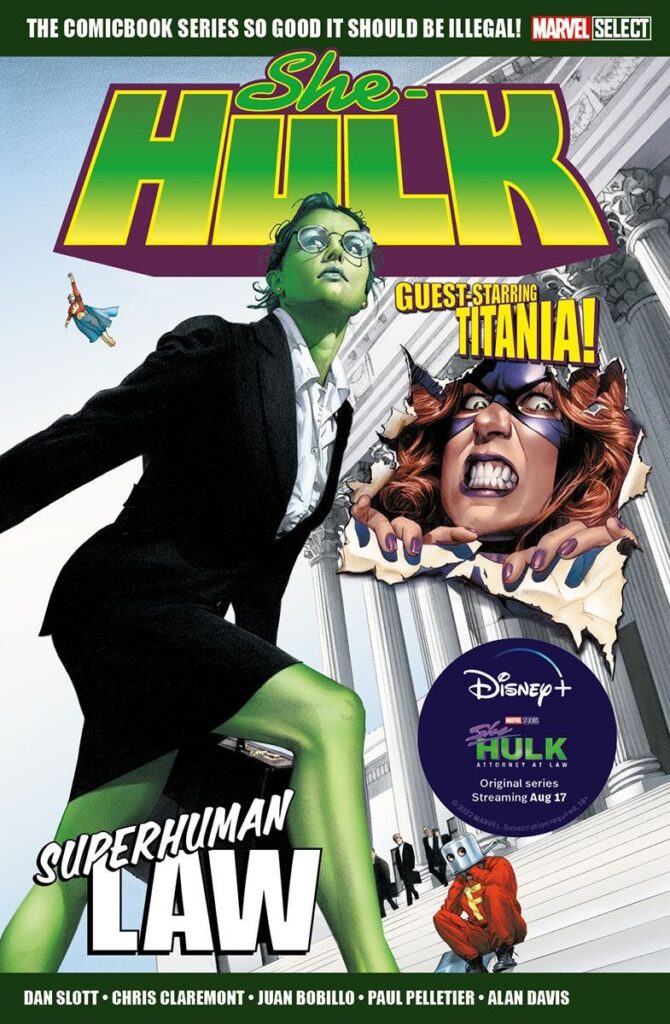
• Marvel Select: She Hulk: Superhuman Law
by Dan Slott, Chris Claremont, et al.
Collecting: She-Hulk #7-12 and material from Solo Avengers #14 | ISBN 978-1804910214 | Softcover 164 pages
Available from all good stores and online retailers, including AmazonUK (Affiliate Link), or direct from Panini
She-Hulk has gone toe-to-toe with some of the world’s deadliest villains, but now she’s facing an all-new challenge – working for a prestigious law firm who specialise in bizarre super-powered court cases. But her work is about to get even weirder as Shulkie is whisked into space by the Living Tribunal to practise Universal Law! Plus, discover the untold secret origin of She-Hulk’s nemesis Titania, as the angry Amazon gets a power boost that transforms her into one of Earth’s strongest villains!
One of many guest posts for downthetubes.
Categories: Comics, Digital Media, downthetubes Comics News, Features, Other Worlds, Reviews, Television, US Comics
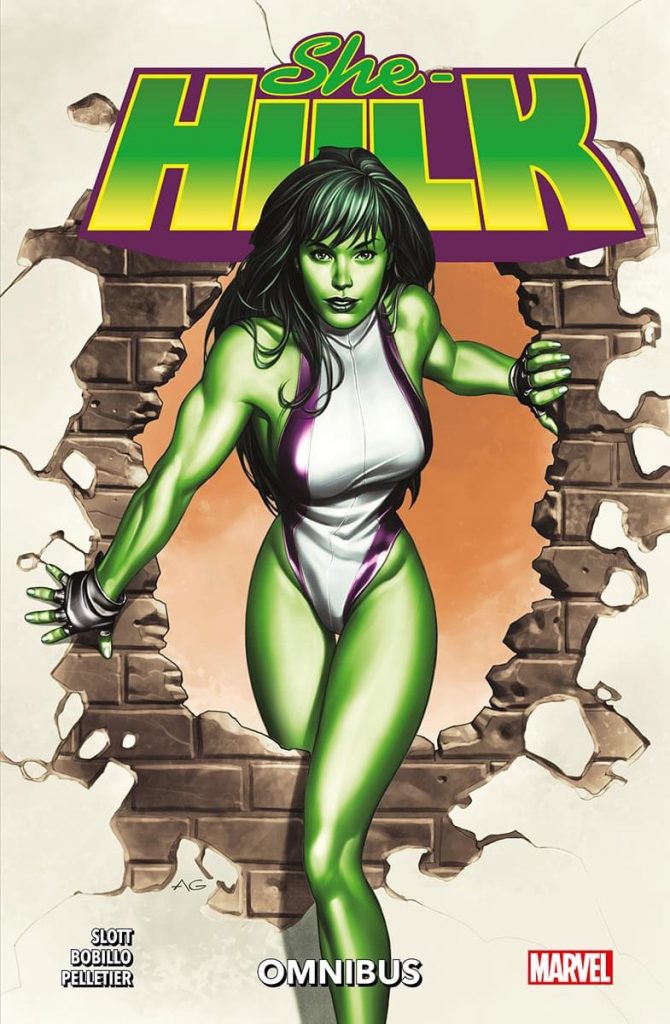
 In Review: Werewolf by Night
In Review: Werewolf by Night  In Review: Ms. Marvel
In Review: Ms. Marvel  In Review: Hawkeye (2021), Episodes 1, 2 and 3
In Review: Hawkeye (2021), Episodes 1, 2 and 3